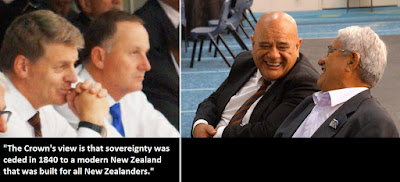 Last week’s BREXIT vote result in the United Kingdom took most markets, media
commentators and government leaders (including John Key) by surprise. They have all badly misjudged
the mood of their peoples.
Last week’s BREXIT vote result in the United Kingdom took most markets, media
commentators and government leaders (including John Key) by surprise. They have all badly misjudged
the mood of their peoples.
However for Iwi and Hapū engaged in
constitutional transformation, the British vote to exit the European Union aligns
with their own constitutional right to independence as first declared by Te
Wakaminenga to the world in He Whakaputanga o Te Rangatiratanga o Nu
Tireni (1835).
[1]Given that it was drafted and first
signed in Te
Tai Tokerau, He Whakaputanga figured largely in that region’s feedback on
constitutional transformation. In Waiomio,
we heard –
“…In my view every discussion of this nature has to begin with tikanga and He
Wakaputanga. They define our independence and predate Te Tiriti … Te Tiriti actually makes no sense unless you understand that ... He Wakaputanga says rangatiratanga is independence, and that makes it like our preamble to Te Tiriti ... a statement of intent that every rangatira would have understood no matter where they lived or whether they signed He Wakaputanga or not.”
“We have lived and
breathed He Wakaputanga … we have seen the Crown reject it, laugh about it … we
have read historians saying it doesn’t mean anything, but we know our tūpuna
thought about it and solemnly put their marks to it because they wanted the
world and the King in England to know we were independent … We know that, we hold to that.”
“He Wakaputanga was
seen by our old people as a form of protection because they could see what was
coming and wanted to make it known that we had mana and were sovereign. We knew all those things from our own history and from the travelling that many of the old people were doing at that time to England and elsewhere. So in some ways it was kind of new, but it was also a really old tradition ... like an evolution to meet challenging times, just like we have to do today.”
“Just the fact that our tūpuna were smart enough to think about such things is important. They weren’t
afraid to talk about their power because they had it, and in Wakaputanga they
told everyone what that meant … When we look at it like that, it was our first written constitution and it is
still relevant today.”
In Kaikohe –
“The Wakaminenga that
is in He Wakaputanga and Te Tiriti is a body unique to us. It met and was in existence years before 1835
and provided a model for all Hapū to work together and make joint independent
decisions. Our people have never lost
sight of it, and neither have we forgotten what it promised.”
“It [He Wakaputanga] has been such an
important part of my life and the life of my whānau. Our tūpuna was there in 1835 and we grew up
hearing stories about he Wakaminenga and the hui about (James) Busby … I think it is important because of all that history and what it says about us ... politically as well as historically.”
At Whatuwhiwhi –
"I know not many Iwi outside
the North signed He Wakaputanga, but its kaupapa is something everyone can
understand. It’s the same kaupapa about
our mana that the old people took to Waitangi five years after He Wakaputanga
was signed, and it’s still our kaupapa today.”
At their hui-a-marama on Saturday, the
members of Te Rūnanga-a-Iwi o Ngāti Kahu considered last week’s BREXIT
vote. They see what is coming and, in the
context of He Wakaputanga, empathise with its drive for independence and
against globalisation.
Next week we will consider
feedback from other regions on He Wakaputanga.
[1] Tenth
edited extract from pp. 45 – 46 of He Whakaaro Here
Whakaumu Mō Aotearoa – The Report of Matike Mai o Aotearoa.

No comments:
Post a Comment